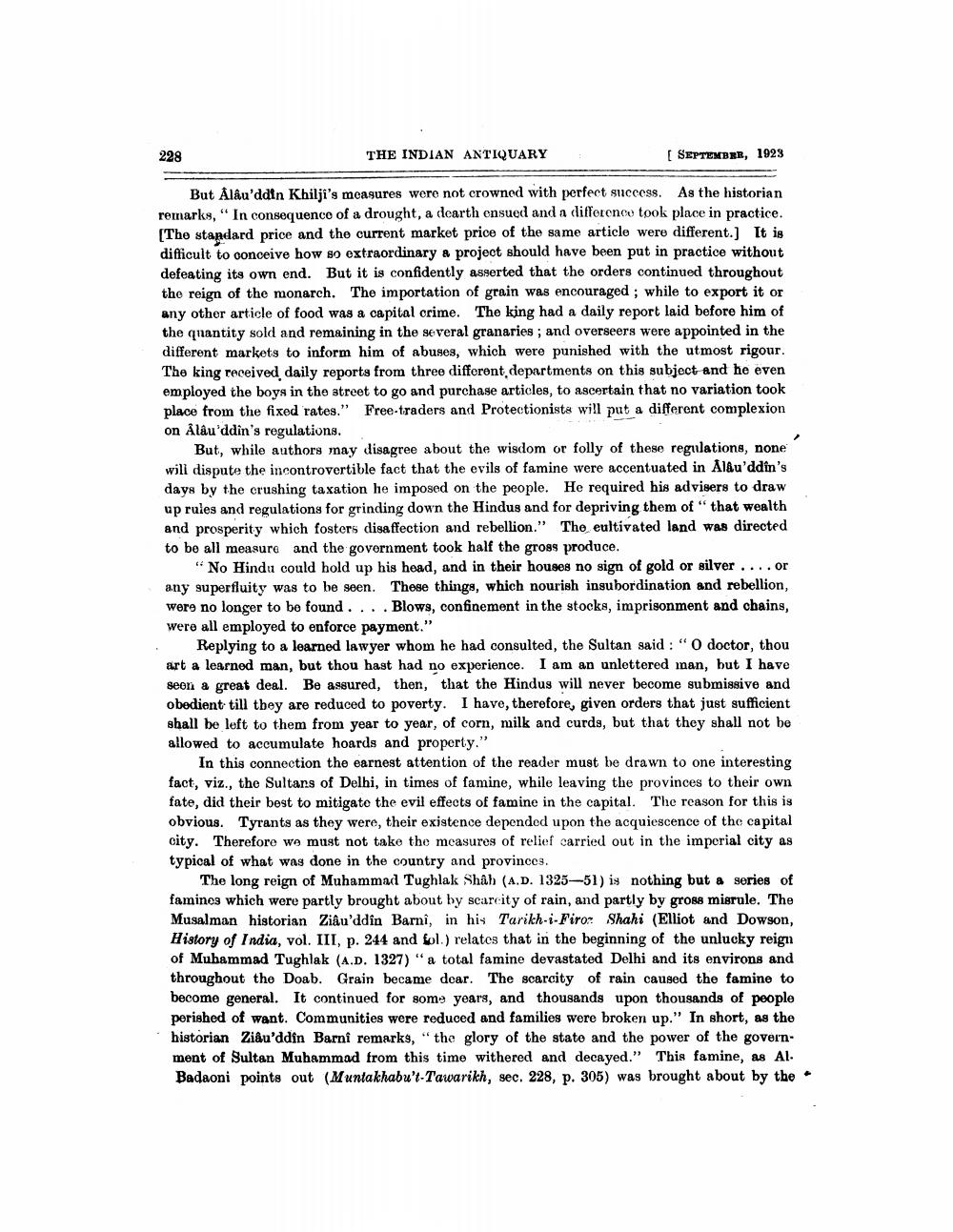________________
228
THE INDIAN ANTIQUARY
SEPTEMBER, 1923
But Alauddin Khilji's moasures were not crowned with perfect success. As the historian remarks, "In consequence of a drought, a dearth ensued and a difference took place in practice. [The standard price and the current market price of the same article were different.] It is difficult to conceive how so extraordinary a project should have been put in practice without defeating its own end. But it is confidently asserted that the orders continued throughout the reign of the monarch. The importation of grain was encouraged; while to export it or any other article of food was a capital crime. The king had a daily report laid before him of the qnantity sold and remaining in the several granaries; and overseers were appointed in the different markets to inform him of abuses, which were punished with the utmost rigour. The king received daily reports from three different departments on this subject and he even employed the boys in the street to go and purchase articles, to ascertain that no variation took place from the fixed rates." Free-traders and Protectionists will put a different complexion on Ålâu'ddin's regulations.
But, while authors may disagree about the wisdom or folly of these regulations, none will dispute the incontrovertible fact that the evils of famine were accentuated in Al&u'ddin's days by the crushing taxation he imposed on the people. He required his advisers to draw up rules and regulations for grinding down the Hindus and for depriving them of "that wealth and prosperity which fosters disaffection and rebellion." The eultivated land was directed to be all measure and the government took half the gross produce.
"No Hindu could hold up his head, and in their houses no sign of gold or silver.... or any superfluity was to be seen. These things, which nourish insubordination and rebellion, were no longer to be found .... Blows, confinement in the stocks, imprisonment and chains, were all employed to enforce payment."
Replying to a learned lawyer whom he had consulted, the Sultan said: "O doctor, thou art a learned man, but thou hast had no experience. I am an unlettered man, but I have seon a great deal. Be assured, then, that the Hindus will never become submissive and obedient till they are reduced to poverty. I have, therefore, given orders that just sufficient shall be left to them from year to year, of corn, milk and curds, but that they shall not be allowed to accumulate hoards and property."
In this connection the earnest attention of the reader must be drawn to one interesting fact, viz., the Sultans of Delhi, in times of famine, while leaving the provinces to their own fate, did their best to mitigate the evil effects of famine in the capital. The reason for this is obvious. Tyrants as they were, their existence depended upon the acquiescence of the capital city. Therefore we must not take the measures of relief carried out in the imperial city as typical of what was done in the country and provinces.
The long reign of Muhammad Tughlak Shah (A.D. 1325-51) is nothing but a series of famines which were partly brought about by scarcity of rain, and partly by gross misrule. The Musalman historian Ziâu'ddin Barni, in his Tarikh-i-Firoz Shahi (Elliot and Dowson, History of India, vol. III, p. 244 and fol.) relates that in the beginning of the unlucky reign of Muhammad Tughlak (A.D. 1327) "a total famine devastated Delhi and its environs and throughout tho Doab. Grain became dear. The scarcity of rain caused the famine to become general. It continued for some years, and thousands upon thousands of people perished of want. Communities were reduced and families were broken up." In short, as the historian Ziauddin Barni remarks, "the glory of the state and the power of the government of Sultan Muhammad from this time withered and decayed." This famine, as Al. Badaoni points out (Muntakhabu'r Tawarikh, sec. 228, p. 305) was brought about by the




